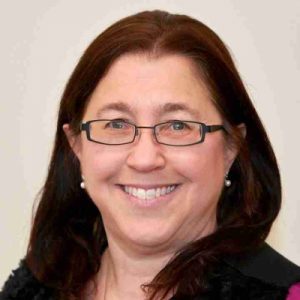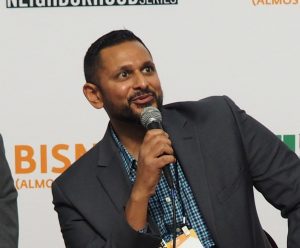
5 Questions With Daphne Knudsen, UMD PhD Candidate & BioBuzz Steering Committee Member
“5 Questions With…” is a recurring BioBuzz series where we reach out to interesting people to share a little about themselves, their work, and maybe something completely unrelated. This week we welcome Daphne Knudsen, PhD Candidate and BioBuzz Steering Committee Member.
Daphne Knudsen is a late-stage PhD student at the University of Maryland, College Park. Her work in Dr. Antony Jose’s lab focuses on understanding RNA interference (RNAi), the process by which double-stranded RNA can cause sequence-specific silencing, and understanding what makes an effective RNAi target.
Knudsen’s research career began while working as an undergraduate in Dr. Dan McKay’s lab at the University of North Carolina at Chapel Hill, where she investigated interactions between transcription factors that were essential for wing development in Drosophila. Wondering whether more translational work would also appeal to her, Knudsen then worked as an undergraduate researcher in Dr. David Tobin’s lab at the Duke University Medical Center where she investigated potential host-directed strategies to combat Mycobacterium marinum infection in zebrafish. Now, as she works on completing her dissertation, she is looking forward to her next research endeavors.
Please introduce yourself to our audience by looking back at your education, training, and career path.
My earliest memory of being interested in genetics is when I asked my parents the dreaded “where do babies come from?” question. Instead of some ambiguous story about a stork, my mom picked up a dry-erase marker and proceeded to draw diagrams on the whiteboard mounted by the kitchen table. She drew an oocyte and a sperm, and then explained how chromosomes carried the instructions to make cells function, and the chromosomes would have to be copied in order to make more cells.
Albeit a lot of the details went over my head (and I couldn’t quite figure out how this connected to the formation of my baby sister), I remember being fascinated by the idea that these small X-shaped structures within cells that I couldn’t see with my own eyes seemed to control all of life. Because of this fascination and thanks to my parents’ emphasis on having a well-rounded education, I wasn’t sure which of the many paths I wanted to go down and found it hard to pick just one thing that I wanted to “be” when I grew up.
Going into college I decided to double major in music and biology (why not?). My research career began when I started as an undergrad in a lab where I aimed to understand the mechanisms behind wing development in fruit flies. I quickly realized how much research strengthened my love of biology. I was impressed by how helpful and how willing the other lab members were to teach me, or just talk about their work with me, and it was inspiring to see people so passionate about their science.
After a year or so of learning basic molecular biology techniques and even getting to use the “fancy” confocal microscope, I expressed interest in going to graduate school to pursue a PhD. At the advice of my advisor, I did a summer project in a lab with a completely unrelated research project, to see if I liked doing science outside of my current lab. Turns out, I just loved doing research, even in a different lab, working with a different model system, to answer completely different questions.
Throughout the last several years while working on my PhD, I have become fascinated with the details behind RNA-based gene silencing. The potential for highly specific RNA-based applications (as drugs or pesticides) is immense, and understanding how different kinds of RNA molecules are broken down within animals is crucial for improving these applications. I am still amazed that such small units of life (cells) are able to function properly given the number of molecules and chemical reactions needed to occur properly within them, and not only to maintain a given cell, but to maintain a complex organism. I look forward to continuing my career in biology; with a seemingly infinite amount of critical questions about how life works to answer, I will always be motivated to chase down as many of those answers as I can.
You began your educational journey with a BA in music, combined with a BS in Biology. Tell us more about the decision between music and the sciences. What led you to make that choice?
Coming into college, I knew I loved music (classical piano focus) and I had an interest in biology, but I struggled to see what a career in science might look like. In fact, I found most of my intro biology and chemistry courses to be quite frustrating because I felt like I had to memorize a bunch of facts and I would lose sight of the bigger picture. Once I started doing undergraduate research, it was like switch flipped; science shouldn’t be about memorizing things, it should be about discovering things. The more I got involved with research the more I felt like I could finally see myself having a fulfilling career in biology.
In many ways, pursuing music is not unlike pursuing science; both require a good deal of patience, diligence, and creativity. I fully believe learning the kind of discipline it takes to consistently practice the piano from a young age helped train me to become a persistent scientist. Music is still a big part of my life; playing the piano helps keep me feel balanced when work and life feel overwhelming. I’ll even play a few tunes to relax before I give a (virtual) talk!
Ultimately the decision came down to this distinction: the amount I would have to work to become a successful, professional musician was starting to take away the joy I would get from playing the piano, whereas the more I dug deep into science, the more I wanted to keep chasing it.
Having been in higher education for the past 10 years, what are some of the most important and impactful principles and skills you’ve learned over the years? What are you looking forward to working on after completing your PhD?
Besides the specifics of my field, I have learned how to (1) effectively handle several different projects at once, and (2) I have learned how to learn.
Even from my undergraduate days I was learning to juggle vastly different responsibilities from my two degrees; I would often run back and forth between the lab and the music department, trying to squeeze in a bit of piano practicing during an incubation for an experiment. This multitasking escalated quickly in my first year of graduate school where I had to juggle my own courses, teaching responsibilities, and finding the lab in which I would conduct my dissertation research. Then, as my research began to pick up, I learned to juggle multiple projects at once, because sometimes in science, a promising lead can turn into a dead end. Being able to maintain several projects at once ensures I have several directions to pursue.
Learning how to learn initially sounds like a strange skill, but it became the most helpful when trying to design my dissertation project and it is crucial for doing good science. How can you decide which experiments to pursue next? Can you evaluate current literature and decipher which claims have been overstated? How do you tackle a problem in an area where you lack expertise? I know that this skill will help me throughout the rest of my career and my life, regardless of the specific direction I choose to follow.
What is your favorite part of the UMD community and the greater Maryland life science ecosystem?
I love how both UMD and the Maryland ecosystem seem to embrace collaboration instead of competition. UMD has always felt like a welcoming place from as early as my interview for graduate school. Sometimes you hear about horror stories of ultra-competitive graduate programs or labs, but everyone I’ve interacted with loves to speak about their work and is happy to hear about yours, or even provide some tips on how to improve an assay or attack a problem from a different perspective. It fosters a much greater sense of community within not only the graduate program, but also within the department and university as a whole.
Additionally, there is a sense of collaboration across the DMV area for labs that study C. elegans (such as the lab I am a part of), where we meet every two weeks to discuss research in progress at the Baltimore Worm Club (real name, check it out!). It is obvious to me from being in these welcoming environments that science can progress faster when we as scientists are willing to help each other achieve our goals.
Now for the fun question – If you could have any job in the world, what would you do?
If science jobs were out of the question: you know that T.V. show where they pay Stanley Tucci to travel across Italy and eat food? I’m not exactly sure what that job title is, but that might be the dream job!
If science jobs were in the question: as long as I can critically think to help discover more truths about how life works, and that these new discoveries can lead to the betterment of our planet in one way or another, that sounds like the perfect job for me.
- About the Author
- Latest Posts
BioBuzz is a community led, experience focused, biotech and life sciences media and events company. BioBuzz highlights regional breaking news, industry professionals, jobs, events, and resources for business and career growth. Their weekly newsletter is subscribed to by thousands in the BioHealth Capital Region and Greater Philadelphia as the go-to for industry updates.








